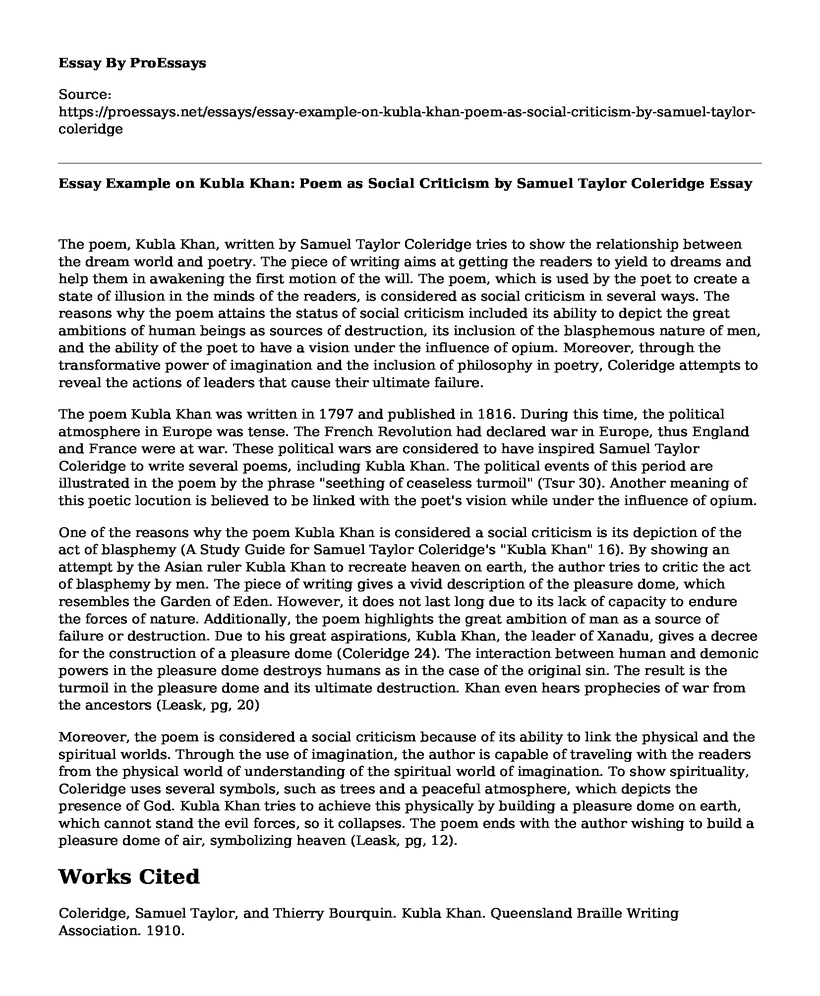The poem, Kubla Khan, written by Samuel Taylor Coleridge tries to show the relationship between the dream world and poetry. The piece of writing aims at getting the readers to yield to dreams and help them in awakening the first motion of the will. The poem, which is used by the poet to create a state of illusion in the minds of the readers, is considered as social criticism in several ways. The reasons why the poem attains the status of social criticism included its ability to depict the great ambitions of human beings as sources of destruction, its inclusion of the blasphemous nature of men, and the ability of the poet to have a vision under the influence of opium. Moreover, through the transformative power of imagination and the inclusion of philosophy in poetry, Coleridge attempts to reveal the actions of leaders that cause their ultimate failure.
The poem Kubla Khan was written in 1797 and published in 1816. During this time, the political atmosphere in Europe was tense. The French Revolution had declared war in Europe, thus England and France were at war. These political wars are considered to have inspired Samuel Taylor Coleridge to write several poems, including Kubla Khan. The political events of this period are illustrated in the poem by the phrase "seething of ceaseless turmoil" (Tsur 30). Another meaning of this poetic locution is believed to be linked with the poet's vision while under the influence of opium.
One of the reasons why the poem Kubla Khan is considered a social criticism is its depiction of the act of blasphemy (A Study Guide for Samuel Taylor Coleridge's "Kubla Khan" 16). By showing an attempt by the Asian ruler Kubla Khan to recreate heaven on earth, the author tries to critic the act of blasphemy by men. The piece of writing gives a vivid description of the pleasure dome, which resembles the Garden of Eden. However, it does not last long due to its lack of capacity to endure the forces of nature. Additionally, the poem highlights the great ambition of man as a source of failure or destruction. Due to his great aspirations, Kubla Khan, the leader of Xanadu, gives a decree for the construction of a pleasure dome (Coleridge 24). The interaction between human and demonic powers in the pleasure dome destroys humans as in the case of the original sin. The result is the turmoil in the pleasure dome and its ultimate destruction. Khan even hears prophecies of war from the ancestors (Leask, pg, 20)
Moreover, the poem is considered a social criticism because of its ability to link the physical and the spiritual worlds. Through the use of imagination, the author is capable of traveling with the readers from the physical world of understanding of the spiritual world of imagination. To show spirituality, Coleridge uses several symbols, such as trees and a peaceful atmosphere, which depicts the presence of God. Kubla Khan tries to achieve this physically by building a pleasure dome on earth, which cannot stand the evil forces, so it collapses. The poem ends with the author wishing to build a pleasure dome of air, symbolizing heaven (Leask, pg, 12).
Works Cited
Coleridge, Samuel Taylor, and Thierry Bourquin. Kubla Khan. Queensland Braille Writing Association. 1910.
Coleridge, Samuel Taylor. Kubla Khan, Or, A Vision in a Dream. D. Gatti, 2000.
Huhn, Peter, and Jens Kiefer. The narratological analysis of lyric poetry: studies in English poetry from the 16th to the 20th century. Vol. 7. Walter de Gruyter, 2011.
Leask, Nigel. "Kubla Khan and orientalism: The road to Xanadu revisited." Romanticism 4.1 (1998): 1-21.
Cite this page
Essay Example on Kubla Khan: Poem as Social Criticism by Samuel Taylor Coleridge. (2023, Feb 12). Retrieved from https://proessays.net/essays/essay-example-on-kubla-khan-poem-as-social-criticism-by-samuel-taylor-coleridge
If you are the original author of this essay and no longer wish to have it published on the ProEssays website, please click below to request its removal:
- The Sociological Criticism of the Book The Kite Runner
- Double-Take: A Memoir by Kevin Connolly Paper Example
- Literary Analysis Essay on Buffy the Vampire Slayer
- Literary Analysis Essay on Pride and Prejudice: Does Mr and Mrs Bennet Good Parents?
- Literary Analysis Essay on The Valley of Ashes Symbolism in The Great Gatsby
- Essay on Reaping What Our Ancestors Sowed: A Metaphorical Look at African American Slavery
- Essay Example on Dracula: Patriarchal Society & Representation of Evil in Female Characters







